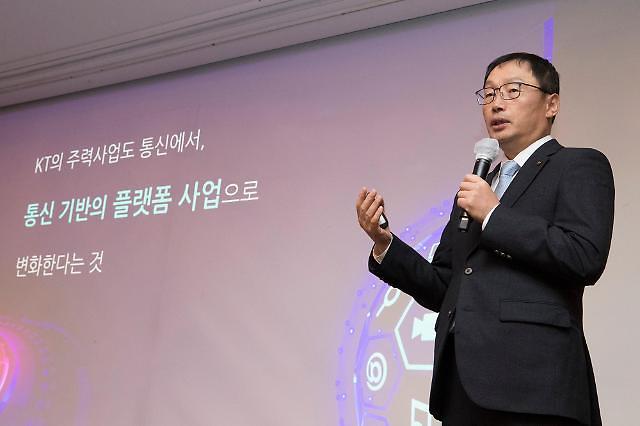
On the 28th, KT CEO Sue Su-mo is presenting the direction of KT’s growth to change into a digital platform company at the’Management Meeting’ on the 28th. (Photo = provided by KT)
KT includes cargo transportation and medical device manufacturing in its business objectives. Through this, the plan is to commercialize smart logistics and infectious disease countermeasure research, which have remained in the existing empirical stage, and to grow them as future foods for de-communication.
KT announced on the 9th that it will discuss the business objectives of the company’s articles of incorporation, including the’cargo transportation business and cargo transportation agency business’ and the’medical device manufacturing and sales business’ at the general shareholders’ meeting scheduled on the 29th through the disclosure on the 9th.
The freight forwarding business and freight forwarding brokerage business are aimed at commercializing smart logistics solutions that have been developed so far. KT began developing smart logistics solutions with Hyundai Construction Equipment last year. The two companies set a goal to develop an advanced smart logistics solution by combining Hyundai Construction Equipment’s unmanned forklift technology with KT’s 5G communication and artificial intelligence (AI) and other ICT technologies and supply them to the market.
Specifically, it plans to develop a service for remotely controlling an unmanned forklift, an AI voice control solution, and a remote after-sales service using video and augmented reality (AR).
Based on these achievements, in November of last year, KT agreed to expand the DX (digital innovation) ecosystem and discover new business opportunities with smart logistics solutions developed with Hyundai Heavy Industries.
The addition of medical device manufacturing and sales business is aimed at expanding the use cases by commercializing health care research that has been conducted so far. For example, in April of last year, KT and the Gates Foundation jointly invested 6 billion won and signed a contract to support’Next Generation Prevention Research for Infectious Diseases Preparedness’. KT formed a consortium with Korea University Medical Center, Mobile Doctor, MediBloc, and KISTI (Korea Institute of Science and Technology Information) and began research on infectious diseases based on ICT such as AI and big data.
In addition, KT and a consortium have developed an AI-based infectious disease response solution based on data accumulated in the jointly developed app, SHINE. KT plans to commercialize this and use it to increase its ability to respond to infectious diseases at home and abroad by expanding its use base.
KT said, “We plan to include cargo transportation, freight forwarding, and medical device manufacturing in the articles of incorporation in order to fully engage in smart logistics solutions and healthcare business.
©’Five-language global economic newspaper’ Ajou Economics. Prohibition of unauthorized reproduction and redistribution
